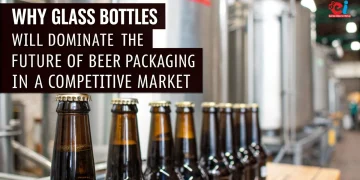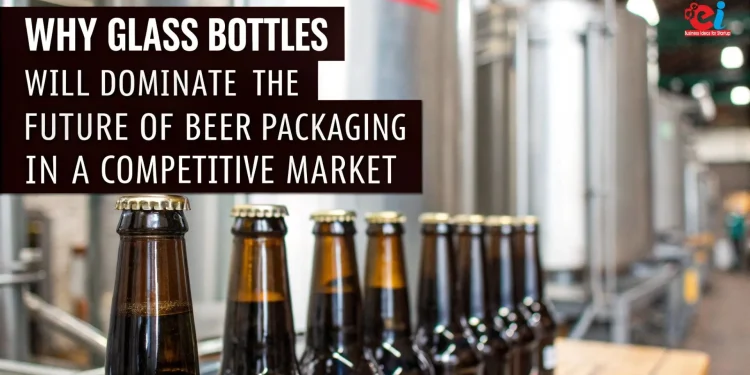With the increased variety in consumer packaging, the Beer Packaging industry is also evolving. There is a wider range of packaging for brewers than ever. Everything from aluminum cans and PET bottles to eco-friendly cartons and kegs are being utilized. However, one packaging option that has remained throughout the years is glass bottles for beer. Regardless of changing trends, glass bottles continue to be a highly functional packaging option within both the luxury and mainstream markets. Glass bottles, despite being labeled an alternative, continue to retain an iconic status due to their rich history, and that does not seem to be changing anytime soon.
This article dives into the importance of glass bottles in the present beer market alongside their functionality, public perception, sustainability credentials, and their value in a world that is competitive and driven by branding.
First Impression of Beer With Glass Bottles
Glass containers have always struck as synonymous with beer. Being transparent and a good conductor of heat provides them with the ability to carry a beer’s sensory appeal. Other than functionality, a glass’s performance as a class conductor provides unrivaled close-to-seals of authenticity as superb craftsmanship and premium quality which resonates heavily with seasoned beer enthusiasts.
An instant association with purity, taste, and terroir springs to mind as consumers spot a brown or green glass bottle of beer on the shelf. The freshness, trust, and confidence a product generates is intertwined with the value of its brand image, and premium beers usually command trust due to their established brand reputation. The clarity of the glass enables the drinker to inspect the contents of the bottle, and this often serves to fortify consumer trust.
While offering easier portability and quicker cooling, cans also do not elegantly portray a brand or its story the way glass does. For marketers in need of projecting craftsmanship or centuries-old brewing customs, glass goes well beyond mere containment. Glass bottles serve as integral devices to fulfill a brand’s distinct identity.
Related: Top 15 Strategies to Build a Profitable Sugarcane Juice Bottling Business
Integrity of the Product and Its Functionality
Using glass containers enables beer manufacturers to extend the shelf life of their product, and allows them to better maintain its quality, catalog, and brand reputation. Glass is inert which means it keeps the contents inside devoid of contamination from the external environment. Unlike plastics which capture scents and release harmful elements, glass does not alter the content’s aroma or flavor. Glass, placed properly with a crown top, becomes a defendable shield to oxygen and moisture which are the primary deterrents to preserving the integrity and quality of beer.
The brown glass type, in particular, provides maximum protection from ultraviolet (UV) light which can breakdown hop compounds in beer leading to “skunky” off-flavors. While green and clear bottles are less protective, they are still used widely due to branding especially in premium or European-style beers. Advances in UV-blocking coatings and inner linings have helped non-brown bottles circumvent these issues.
The technical advantages of glass enable beer lagers, wheat beers, and bottle-conditioned brews to retain fizziness and mouthfeel along with carbonation for an extended duration. This aids in preserving the structure strength of glass. The features also ensure maintained product quality along with an increased shelf life which makes glass an ideal option for distant market targeting breweries.
Sustainability and the Circular Economy
With aluminum and some plastics being recyclable, the requirement of sustaining environment makes glass stand out with its advantage of infinite recyclability without loss in quality. A used glass bottle can be melted down and reshaped into a new bottle without limit—this defines the core concept of circular economy.
Furthermore, many parts of the world have efficient processes set up for glass recycling. Germany, the Netherlands, and some of the Indian states have implemented successful multi-use bottle schemes where glass bottles are collected, cleaned, and reused several times before being recycled. Such programs not only lessen the carbon footprint but also save money for companies like breweries and other beverage fillers.
Glass is also manufactured from widely available raw materials—mostly silica sand, soda ash, and limestone—which makes its environmental impact less than plastic. Its production requires significant amounts of energy, but using cullet (glass that’s been recycled) reduces the melting point, which decreases carbon dioxide emissions.
In developing economies where waste management systems are still being implemented, promoting glass recycling and rewards for return incentives can further improve the carbon footprint. Brands wishing to solidify their green identity will find glass an unmatched credible option since it upholds their ideologies designating it a sustainable material.
Premiumization and Brand Storytelling
As a result of an increase in the number of craft breweries and the premiumization trend of beer, there’s been heightened competition in glass bottle advertising. Glass bottles are easily customizable which allows for careful detailed labeling and embossing and can portray something as simple as elegance to meticulous detail.
Unlike cans which have a preset shape, glass bottles can be tailored into various outlines—the stout bottle of pale ales, the European lager long neck bottle, and craft brewers’ swing top bottles. Such customizability improves identifiability and recall to consumers.
In hospitality venues such as bars, hotels, and restaurants, glass bottles still remain the favored serving vessel because of their aesthetic appeal. Customers view bottled beer as more accurate when compared to draft or canned beer, particularly when served chilled without the cap in front of them. This ceremony strengthens the feeling of indulgence.
Moreover, for beer brands that are focused on local ingredients, centuries-old recipes or sustainability, glass packaging gives them the opportunity to share the story externally in effective form and purpose.
Related: Growing Demand for Beverage Packaging.
Looking Towards the Future
Though glass bottles still have their advantages, their weaknesses are inevitable. Since they possess greater weight than cans, transportation costs and emissions carbon increases. Glass bottles also tend to be more fragile which requires extra care during logistics and storage. For breweries dealing with remote regions, cans are more optimal due to their lightweight and shatterproof design.
Nevertheless, these constraints simultaneously provide room for change. The efficiency of glass in beer packaging is being enhanced through the development of more ergonomic light glass bottles, stronger protective coatings, and modular return systems. Moreover, traditional forms of glass packaging can be updated to incorporate modern consumer interaction through smart packaging technologies like QR codes, RFID tracking, and augmented reality storytelling.
Where returnable glass bottle refill systems are well established, breweries can leverage them not only as an environmental program but as a marketing tool. Brand engagement can be deepened through rewards-for-return schemes, deposit and loyalty gamification systems, while simultaneously encouraging circular usage.
Conclusion: Beer in Glass Bottles – Evolving Classics
Among the latest trends in beer packaging, glass beer bottles continue to stand out. Even with the growing use of other formats, their tendency to preserve taste, fortify branding, and support sustainability commitments keeps glass bottles relevant.
Instead of being discarded, glass bottles are being transformed for the future to make them lighter, more technologically advanced, and eco-friendly. To breweries where quality, tradition, and bold visual identity are paramount, glass transcends its utility as a container; it is a proclamation. No doubt, as the beer industry keeps innovating and adapting to changing customer perceptions, glass bottles will continue to be an essential part of that evolution.
Niir Project Consultancy Services (NPCS) offers detailed project reports, market analysis, machinery sourcing, and end-to-end guidance for setting up bottling units using glass bottles for beer and other beverages.


















